I’m on record as not being a huge fan of this particular movie, but damn, Anderson is good at what he does. Cf. David Bordwell discussing The Grand Budapest Hotel. Filed under: Wes Anderson.
Tag: wesanderson
The Grand Budapest Hotel

The Grand Budapest Hotel. I dig it. It’s got the usual fussy-awesome art direction and some technically interesting camera stuff, but what I really liked here: a good heart. Didn’t have much of the rooted dysfunction or cynicism or weariness that made some of his previous movies kind of a drag for me at times. I think I’ll call this my favorite of the Wes Anderson movies I’ve seen.
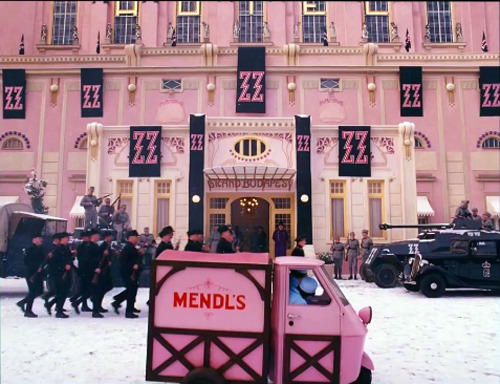
Observations on film art : THE GRAND BUDAPEST HOTEL: Wes Anderson takes the 4:3 challenge.
In Grand Budapest Hotel we move from the present, more or less, to events in the 1980s, then the 1960s, and eventually the 1930s, which constitute the central episodes.
Anderson has shot the frame stories in different aspect ratios. It’s 1.85 for the near present and the 1980s, when the Author recounts meeting the hotel owner. That meeting, set in the 1960s, is shown in 2.40, the anamorphic aspect ratio. The central story, taking place in the 1930s, is presented in classic 1.37, or 4:3 imagery. With typical Anderson butterfly-collector wit, each era gets a ratio that could have been used in a movie at the time. It’s remarkable that Anderson could persuade Fox Searchlight to let him do this, but it’s also a gift of digital projection: This play with ratios wouldn’t have been possible on film.
I knew something was up, I just couldn’t put my finger on it.
Does Wes Anderson hate dogs?: The New Yorker
Maiming and death are just as central to Anderson’s vision of things as are all the precise costumes that his characters wear. Misfortune comes just as suddenly to dogs as it does to humans. By including the beloved dog in this condition of life, he reminds us that no one is safe. […] Another way to look at it is that these dogs are most often punished as collateral damage of the moral and practical ineptitude of adults.
Moonrise Kingdom
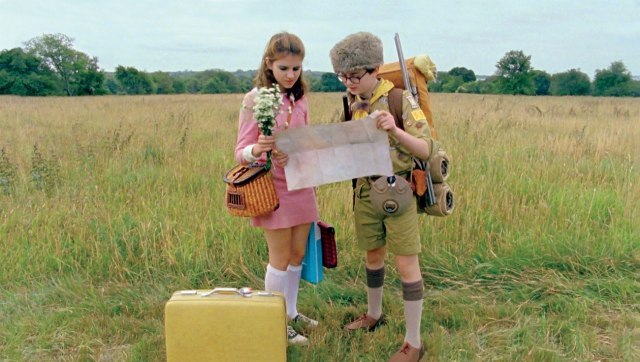
Moonrise Kingdom. Wes Anderson is simply not my director. When I wrote about Bottle Rocket, I had the thought:
I wonder if I’d like his movies more if I’d seen them as serials?
I wonder about this because the structural repetition really wears on me over the course of a movie. Repetitive framing, symmetry, truck here, pan there, dolly now and then. It’s like a slideshow sometimes. I respect the precision and fastidiousness, but for most of it I just couldn’t sustain an emotion beyond “that’s kinda neat”. Because I have no heart, basically. Or I don’t function well with magical realism. Or because the script is on the bad side, and while there’s invention, there are no surprises. Everything tidy, labeled, anticipated. It’s not terrible, though. Just frustrating. I did LOL on multiple occasions. And using The Young Person’s Guide to the Orchestra to open the movie, and then mirroring that work, was clever. Kids run away (main theme), then we follow reactions by the group of scouts, the scout leader, the cop, the parents, and social services (variations). My rankings for Anderson’s films that I’ve seen:
- The Darjeeling Limited
- The Royal Tenenbaums
- Moonrise Kingdom
- Bottle Rocket
- Rushmore

Wes Anderson’s Arrested Development. Interesting criticism here. This led to an aha! moment for me:
Nothing more perfectly evokes the feeling of both a child’s literal interpretation of the world and youthful big ambition on a frustratingly small scale like a school play, and Anderson smartly adopts this style.
[…] We don’t lose ourselves in the emotion of the production, and for the same reason we’re not meant to lose ourselves in the story of an Anderson film. Like in a children’s play, we are meant to be aware at all times of creative effort, for this is where its true value lies. Anderson’s ability to blend substance and form and communicate this feeling is his greatest skill. His films look like a stage plays: Sets look like sets, the frame becomes the proscenium arch (with a symmetry in the set that exaggerates and enhances the frame’s boundaries), and the action is kept in the center of the frame, usually directed out toward the audience in mainly medium or wide shots.
And I like this:
Anything that helps to enlarge an understanding is important, as large thinking is contagious and will contaminate all other areas of your life, so that eventually nothing will be allowed to remain simple and small.
Bottle Rocket
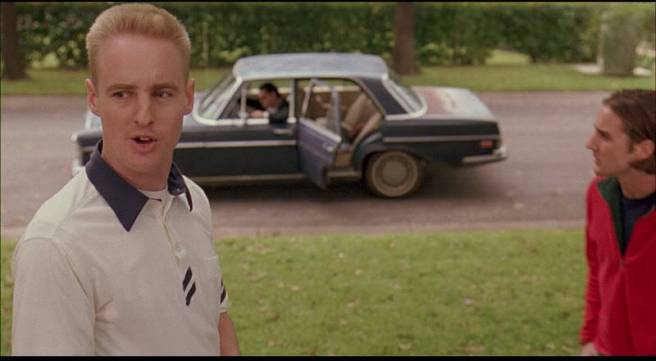
Bottle Rocket. Eh. I’d like to see the short film that was the germ of this full-length one. My current Wes Anderson rankings: 1. The Darjeeling Limited 2. The Royal Tenenbaums 3. Bottle Rocket 4. Rushmore. I wonder if I’d like his movies more if I’d seen them as serials? Seems like a more forgiving format for these somewhat aimless stories, but still have some interesting moments sprinkled around.
The Royal Tenenbaums
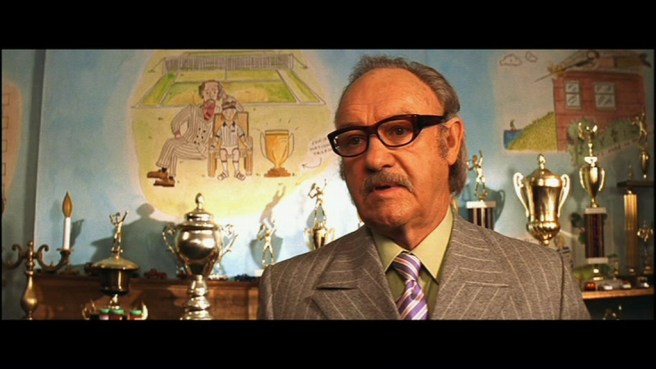
The Royal Tenenbaums. Film #3 in my Wes Anderson self-education program. I’d rank this one below The Darjeeling Limited, above Rushmore. Anderson can start a movie with the best of them, but I’m not sure he’s a good finisher. But I can appreciate how he rides the edge between comedy and tragedy. I’m not sure I understand the soundtracks, though. I don’t think it’s simply a bald move for hip points – “Hey, listen to how cool my music collection is. Pretty good taste, eh?” – but I can’t help but find it somewhat annoying.
Rushmore

Rushmore. This is my second Wes Anderson film (previously). I knew next to nothing about it before I started, maybe some prepping would have helped. In the end I say, “not worth it”. I almost didn’t finish. Next up, Royal Tenenbaums.
The Darjeeling Limited
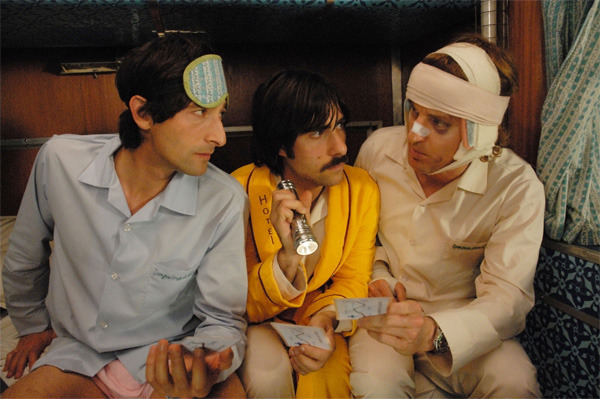
The Darjeeling Limited. This is the first Wes Anderson I’ve ever seen. I liked it, but didn’t fall in love with it. Strange feeling to have such a wandering, aimless plot captured with such anal precision.
